
Cardiac glycosides are a class of organic compounds that increase the output force of the heart and decrease its rate of contractions by inhibiting the cellular sodium-potassium ATPase pump. Their beneficial medical uses are as treatments for congestive heart failure and cardiac arrhythmias; however, their relative toxicity prevents them from being widely used. Most commonly found as secondary metabolites in several plants such as foxglove plants, these compounds nevertheless have a diverse range of biochemical effects regarding cardiac cell function and have also been suggested for use in cancer treatment.
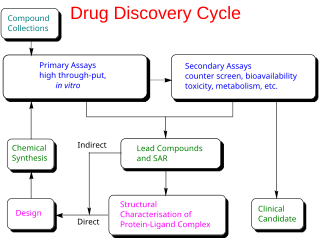
In the fields of medicine, biotechnology and pharmacology, drug discovery is the process by which new candidate medications are discovered.
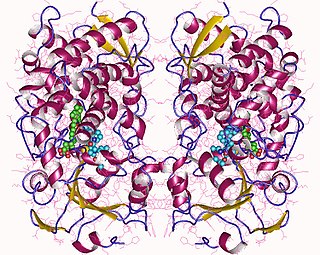
Cytochrome P450 3A4 is an important enzyme in the body, mainly found in the liver and in the intestine, which in humans is encoded by CYP3A4 gene. It oxidizes small foreign organic molecules (xenobiotics), such as toxins or drugs, so that they can be removed from the body. It is highly homologous to CYP3A5, another important CYP3A enzyme.

Nerium oleander, most commonly known as oleander or nerium, is a shrub or small tree cultivated worldwide in temperate and subtropical areas as an ornamental and landscaping plant. It is the only species currently classified in the genus Nerium, belonging to subfamily Apocynoideae of the dogbane family Apocynaceae. It is so widely cultivated that no precise region of origin has been identified, though it is usually associated with the Mediterranean Basin.
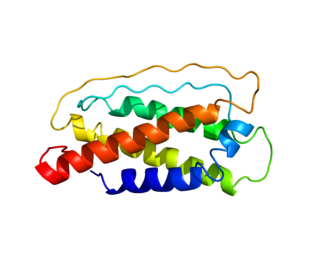
Interleukin 7 (IL-7) is a protein that in humans is encoded by the IL7 gene.

Seliciclib is an experimental drug candidate in the family of pharmacological cyclin-dependent kinase (CDK) inhibitors that preferentially inhibit multiple enzyme targets including CDK2, CDK7 and CDK9, which alter the growth phase or state within the cell cycle of treated cells. Seliciclib is being developed by Cyclacel.This is a phase II, dose ranging, multicenter, randomized, double-blind, placebo-controlled study.

Flossie Wong-Staal was a Chinese-American virologist and molecular biologist. She was the first scientist to clone HIV and determine the function of its genes, which was a major step in proving that HIV is the cause of AIDS. From 1990 to 2002, she held the Florence Riford Chair in AIDS Research at the University of California, San Diego (UCSD). She was co-founder and, after retiring from UCSD, she became the chief scientific officer of Immusol, which was renamed iTherX Pharmaceuticals in 2007 when it transitioned to a drug development company focused on hepatitis C and continued as chief scientific officer.

Tolfenamic acid is a member of the anthranilic acid derivatives class of NSAID drugs discovered by scientists at Medica Pharmaceutical Company in Finland. Like other members of the class, it is a COX inhibitor and prevents formation of prostaglandins.
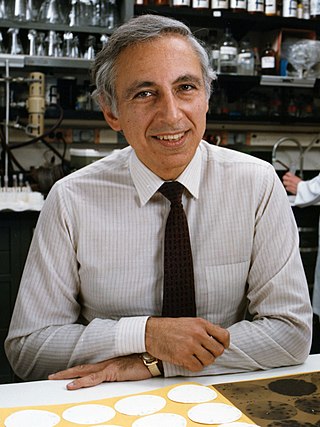
Robert Charles Gallo is an American biomedical researcher. He is best known for his role in establishing the human immunodeficiency virus (HIV) as the infectious agent responsible for acquired immune deficiency syndrome (AIDS) and in the development of the HIV blood test, and he has been a major contributor to subsequent HIV research.
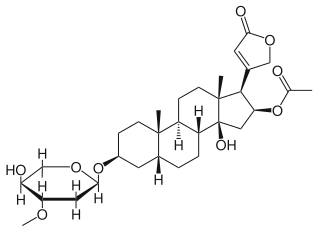
Oleandrin is a cardiac glycoside found in the poisonous plant oleander. As a main phytochemical of oleander, oleandrin is associated with the toxicity of oleander sap, and has similar properties to digoxin.
Glembatumumab vedotin is an antibody-drug conjugate (ADC) that targets cancer cells expressing transmembrane glycoprotein NMB (GPNMB).
Isogenic human disease models are a family of cells that are selected or engineered to accurately model the genetics of a specific patient population, in vitro. They are provided with a genetically matched 'normal cell' to provide an isogenic system to research disease biology and novel therapeutic agents. They can be used to model any disease with a genetic foundation. Cancer is one such disease for which isogenic human disease models have been widely used.
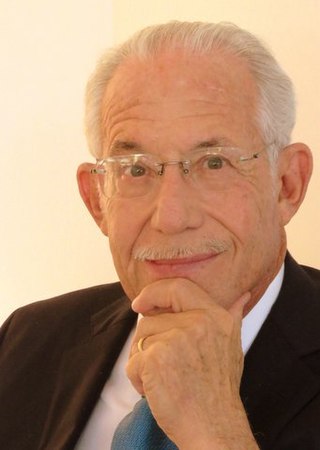
William A. Haseltine is an American scientist, businessman, author, and philanthropist. He is known for his groundbreaking work on HIV/AIDS and the human genome.
Arthur Furst was an American born toxicologist and cancer researcher. He was involved in the creation of the Cancer Chemotherapy Laboratory at Stanford Medical School.

Chinedum Peace BabalolaFAS, FAAS is a Nigerian Professor of Pharmaceutical chemistry and Pharmacokinetics. She is the first female Professor of Pharmacy in the University of Ibadan, FAS and FAAS and the second female Nigerian FAAS. She is the incumbent Vice Chancellor of Chrisland University, Nigeria.
Benjamin Weiss is an American neuropharmacologist, Emeritus Professor of Pharmacology and Physiology at Drexel University College of Medicine. He is best known for his work with cyclic nucleotide phosphodiesterases. He was the first to propose, based on his experimental work, that selective inhibition of phosphodiesterases which are expressed differentially in all tissues, could be used as a target for drug development. His work is the basis for many marketed and developmental human drugs that selectively inhibit cyclic nucleotide phosphodiesterases.
Karen Seibert was an American pharmacological scientist, instrumental in the elaboration of the COX-2 inflammatory pathway and in the discovery of inhibitors of COX-2, such as celecoxib (Celebrex), used to relieve pain and treat arthritis. At the time of her death from cancer on 9 November 2020 aged 61, she was Professor of Anesthesiology, Pathology and Immunology, and Genetics, and Executive Director of the Center for Clinical Pharmacology in the Department of Physiology at Washington University School of Medicine in St. Louis MO.
Roy S. Herbst is an American oncologist who is the Ensign Professor of Medicine, Professor of Pharmacology, Chief of Medical Oncology, and Associate Director for Translational Research at Yale Cancer Center and Yale School of Medicine in New Haven, Connecticut.
Richard B. Gaynor is an American physician specializing in hematology-oncology, educator, drug developer, and business executive. He served as an Associate Professor of Medicine at UCLA School of Medicine for nearly a decade, and subsequently as an endowed Professor of Medicine and Microbiology at the University of Texas Southwestern Medical School prior to joining the pharmaceutical industry in 2002. His research on NF-κB, IκB kinase, and other mechanisms regulating viral and cellular gene expression has been covered in leading subject reviews. He has been a top executive at several pharmaceutical companies, with respect to the development and clinical testing of novel anticancer drugs and cell therapies. For over a decade and a half, he worked at Eli Lilly and Company, where he became the Senior Vice President of Oncology Clinical Development and Medical Affairs in 2013. Gaynor was President of R&D at Neon Therapeutics from 2016 to 2020, when he became the President of BioNTech US, both pharmaceutical companies headquartered in Cambridge, MA. His honors include being elected a member of the American Society for Clinical Investigation, and the Association of American Physicians.
John A. Hickman is a British-French cancer pharmacologist.












